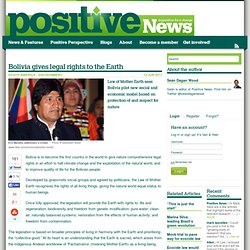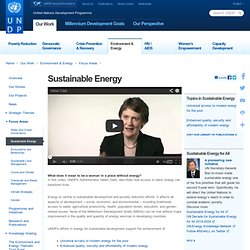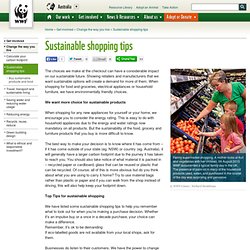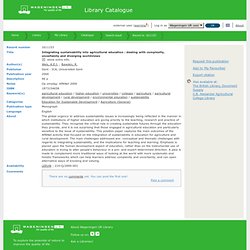

Bolivia gives legal rights to the Earth. Evo Morales addresses a crowd.

Photo © Sebastian Baryli (www.flickr.com/photos/sebastian-baryli) Bolivia is to become the first country in the world to give nature comprehensive legal rights in an effort to halt climate change and the exploitation of the natural world, and to improve quality of life for the Bolivian people. Developed by grassroots social groups and agreed by politicians, the Law of Mother Earth recognises the rights of all living things, giving the natural world equal status to human beings.
Once fully approved, the legislation will provide the Earth with rights to: life and regeneration; biodiversity and freedom from genetic modification; pure water; clean air; naturally balanced systems; restoration from the effects of human activity; and freedom from contamination. The legislation is based on broader principles of living in harmony with the Earth and prioritising the “collective good.”
Giuditta Vittadini.pdf. Diagram of sustainable developmet. Energy politics. Sustainable Energy. Energy is central to sustainable development and poverty reduction efforts.

It affects all aspects of development -- social, economic, and environmental -- including livelihoods, access to water, agricultural productivity, health, population levels, education, and gender-related issues. None of the Millennium Development Goals (MDGs) can be met without major improvement in the quality and quantity of energy services in developing countries. UNDP's efforts in energy for sustainable development support the achievement of: Access to sustainable sources of clean, reliable and affordable energy has a profound impact on multiple aspects of human development; it relates not only to physical infrastructure (e.g. electricity grids), but also to energy affordability, reliability and commercial viability.
In practical terms, this means delivering energy services to households and businesses that are in line with consumers' ability to pay. What do you eat? Wwf - Sustainable shopping tips. The choices we make at the checkout can have a considerable impact on our sustainable future.

Showing retailers and manufacturers that we want sustainable options will create a demand for more of them. When shopping for food and groceries, electrical appliances or household furniture, we have environmentally friendly choices. We want more choice for sustainable products When shopping for any new appliances for yourself or your home, we encourage you to consider the energy rating. This is easy to do with household appliances due to the energy and water ratings now mandatory on all products. The best way to make your decision is to know where it has come from – if it has come outside of your state (eg. Top Tips for sustainable shopping We have listed some sustainable shopping tips to help you remember what to look out for when you’re making a purchase decision. Businesses do listen to their customers.
Integrating sustainability into agricultural education : dealing with complexity, uncertainty and diverging worldviews. Union Catalogue of Agricultural Libraries in the Netherlands The Wageningen UR Library Catalogue contains bibliographic data on books and periodicals held by the libraries of Wageningen University and Research Centre and some 15 associated libraries.

Holding data are added to each record. Subjects covered include Agrotechnology, Food and Food Production, Plant and Animal Sciences, Soil Science, Geo-information, Landscape and Spatial Planning, Water and Climate, Ecosystem Studies, Economics and Society. The joint collections of the participating libraries cover a substantial part of the internationally available scientific literature in these disciplines. As far as Dutch scientific literature in these fields is concerned, coverage can be considered near 100%, including much of the so-called "grey literature". All titles are entered in their original language.